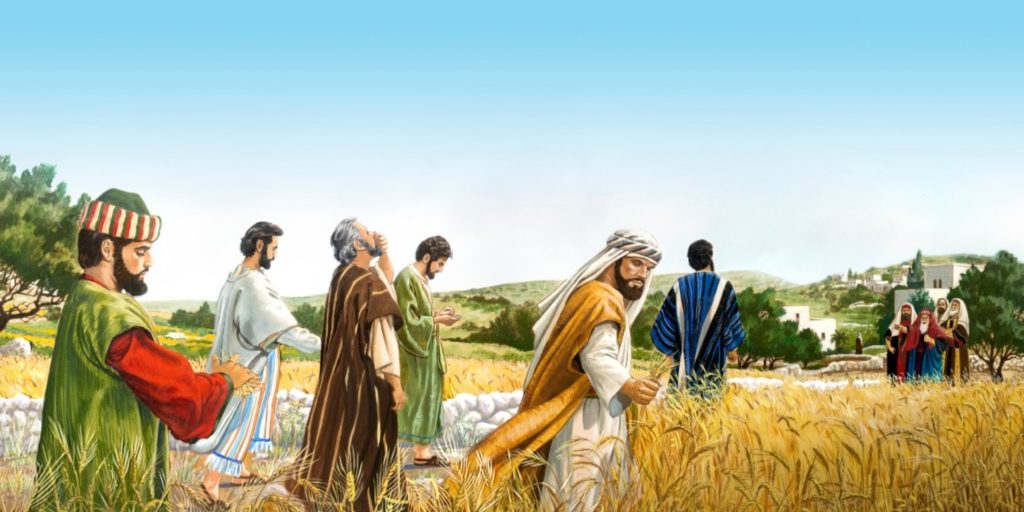
Matthew 12:1-8
¹At that time Jesus went through the grainfields on the Sabbath, and His disciples became hungry and began to pick the heads of grain and eat.
²But when the Pharisees saw this, they said to Him, “Look, Your disciples do what is not lawful to do on a Sabbath.”
³But He said to them, “Have you not read what David did when he became hungry, he and his companions, ⁴how he entered the house of God, and they ate the consecrated bread, which was not lawful for him to eat nor for those with him, but for the priests alone? ⁵Or have you not read in the Law, that on the Sabbath the priests in the temple break the Sabbath and are innocent?
⁶But I say to you that something greater than the temple is here. ⁷But if you had known what this means, ‘I desire compassion, and not a sacrifice,’ you would not have condemned the innocent. ⁸For the Son of Man is Lord of the Sabbath.”
Study
Being in the corn-fields, the disciples began to pluck the ears of corn: the law of God allowed it (Deuteronomy 23:25).
This was slender provision for Christ and his disciples; but they were content with it.
The Pharisees did not quarrel with them for taking another man’s corn, but for doing it on the sabbath day.
Christ came to free his followers, not only from the corruptions of the Pharisees, but from their unscriptural rules, and justified what they did.
The greatest shall not have their lusts indulged, but the meanest shall have their wants considered.
Those labours are lawful on the sabbath day which are necessary, and sabbath rest is to froward, not to hinder sabbath worship.
Needful provision for health and food is to be made; but when servants are kept at home, and families become a scene of hurry and confusion on the Lord’s day, to furnish a feast for visitors, or for indulgence, the case is very different.
Such things as these, and many others common among professors, are to be blamed. The resting on the sabbath was ordained for man’s good (Deuteronomy 5:14).
No law must be understood so as to contradict its own end. And as Christ is the Lord of the sabbath, it is fit the day and the work of it should be dedicated to him.
The account contained in Matthew 12:1-8 is also recorded in Mark 2:23-28, and Luke 6:1-5.
At that time
Luke 6:1 fixes the time more particularly.
He says that it was “the second Sabbath after the first.”
To understand this, it is proper to remark that the “Passover” was observed during the month “Abib,” or Nisan, answering to the latter part of March and the first of April.
The feast was held for seven days, commencing on the fourteenth day of the month (Exodus 12:1-28; 23:15), on the “second” day of the pascha-week.
The law required that a sheaf of “barley” should be offered up as the first-fruits of the harvest (Leviticus 23:10-11).
From this day was reckoned seven weeks to the feast of “Pentecost” (Leviticus 23:15-16), called also the feast of weeks (Deuteronomy 16:10), and the feast of the harvest (Exodus 23:16).
This second day in the feast of the Passover, or of unleavened bread, was the beginning, therefore, from which they reckoned toward the Pentecost.
The Sabbath in the week following would be the “second Sabbath” after this first one in the reckoning, and this was doubtless the time mentioned when Christ went through the fields.
It should be further mentioned, that in Judea the barley harvest commences about the beginning of May, and both that and the wheat harvest are over by the twentieth.
Barley is in full ear in the beginning of April.
There is no improbability, therefore, in this narrative on account of the season of the year. This feast was always held at Jerusalem.
Through the corn
Through the “barley,” or “wheat.”
The word “corn,” as used in our translation of the Bible, has no reference to “maize,” or “Indian corn,” as it has with us. Indian corn was unknown until the discovery of America, and it is scarcely probable that the translators knew anything about it.
The word “corn” was applied, as it is still in England, to wheat, rye, oats, and barley. This explains the circumstance that they “rubbed it in their hands” (Luke 6:1) to separate the grain from the chaff.
□ ■ □
Read more of these messages at: https://devotionals.harryschoemaker.nl
Download your Bible pictures from: http://bijbelplaatjes.nl
Email: devotionals@harryschoemaker.nl
Follow me on:
Facebook: https://facebook.com/worldwide.ekklesia
Facebook: https://facebook.com/biblestudy.hs
Twitter: @schoemakerharry



